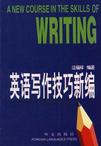英语写作技巧新编
1997-08
外文出版社
汪福祥
411
在全国性的英语教学会议上,专家们一致反映,中国学生的英文写作存在着很多问题。对于学生们自己来说,写作也是最令人头痛的难题。究其原因,造成写作困难的主要因素可归结为四个方面:语言障碍、母语思维方式的影响、思想和表达思想能力的缺乏以及写作知识和写作技巧的生疏。 首先,缺乏系统和规范的语言知识是造成语言障碍的主要因素。比如:中国学生在学习英语单词时,大都只注意单词的表意,对词的潜在之意,特别是词的重量、词的精神以及词在不同语境中产生的不同语意等知识了解甚少。此外,中国学生在英语时态、句子结构以及英语修辞等方面的训练更是欠缺。再加上中国学生一般容易忽视应用语言学和社会语言学的系统研究以及写作意识的培养,就更加剧了写作的难度。 除语言功底外,母语思维方式的干扰也是造成写作困难的重要因素。语言是社会和文化的产物,是生活在特定的社会和文化之中的人所持有的特有思维方式的表现形式。因此,社会和文化的差异决定了语言形式和思想表达方式的不同。按照语言学家用普系分类法对语言的分类,英语属印欧语系日耳曼语族的西日耳曼语支,而汉语则属汉藏语系,是两种完全不同的语言。仅以“客气”这一概念为例,中国人习惯用“贬低自己所做的实际工作”的方式来表达,从而产生了诸如“我没有什么好说的”,’“我没做什么准备”以及“哪里,哪里”之类的说法。
致力于解决中国学生在英语写作中面临的四个主要问题,即语言障碍,母语思维方式的影响,思想表达能力的缺乏及写作技巧的生疏:在介绍写作基础知识的同时,《英语写作技巧新编》从写作的各个环节入手,引导学生把握正确的写作思路,掌握丰富的写作技巧.书中范例均选自欧美最新报刊和当代文学作品.每一个讲解点都配有针对性强的练习.第八章总练习对开启写作思路,磨炼写作技巧更加具有指导意义.
汪福祥,1977年毕业于北京第二外国语学院并留校任教。1981年获澳大利亚政府奖学金,赴澳大利亚堪培拉高等教育学院留学并获硕士学位。1987年应国家教委邀请赴朝鲜平壤外国语大学,为第13届世界青年节培训同声译员。在二外先后担任口译、英汉翻译、英文写作、谈判技巧等科目的教学工作1992年被评为北京市高等学校优秀青年骨干教师。除翻译教学工作外,现主要从事行为心理学、翻译理论和英文写作的研究工作。主要著作:《高级英语习语功能教程》《广告英语选读》《现代英语妙语珠连》《英语书信写作与应用》《奥妙的人体语言》《神奇的无声语言》
CONTENTSChapter 1A Framework for Writing in English1. The Linguistic Competence of the Writer2. Adjusting the Ways of Thinking3. Cultural Awareness and the Writing Senses4. Developing the Writing Skills5 How This Book Can BeBest UsedChapter 2The Use of Words1. Parts of Speech and Their Functions1.1 Nouns1.2 Verbs1.3 Adjectives1.4 Prepositions2. The Concrete and Accurate Use of Words2.1 Concrete Words2.2 Accurate Words3. The Effective and Artistic Use of Words3.1 Imitative Words3.2 Sight Words3.3 Touch Words3.4 Sound Words3.5 Taste and Smell Words3.6 Intensifiers3.7 Adjectives for Describing a Person4. Usual Words for Unusual Effect4.1 The Exaggerated Use of Words4.2 Vivid Words for Vivid PicturesChapter 3Sentence Writing Skills1. Verb Agreement within a Sentence2. Sentence Patterns for Statements3. Sentences with Adverbials4 Attributes and Attributive Clauses4.1 The Functioning Positions of Attributes4.2 Elements Serving as Attributes4.3 Defining Attributive Clauses4.4 Non-defining Attributive Clauses5 Subjects and Subjective Clauses5.1 Elements Functioning as Subjects5.2 Subjective Clauses5.3 The "It" Structure6. Predicative Clauses7. Object Clauses8 Complex and Longer Sentences8.1 Complex Sentences with Noun Clauses8.2 Complex Sentences with Adjective Clauses8.3 Complex Sentences with Adverbial Clauses9. Inverted Sentences10. Parallel Structureb11. Sentence Euphony12 Sentence VarietyChapter 4Paragraph Planning and Development1 Paragraph Variety1.1 Sample Opening Paragraphs1.2 Sample Body Paragraphs1.3 Sample Concluding Paragraphs1.4 Sample Comprehensive Paragraphs1.5 Sample Paragraphs of Various Styles2 Paragraph Quality2.1 Fullness2.2 Unity2.3 Coherence2.4 Emphasis2.5 Brevity2.6 Euphony3 Paragraph Development Techniques3.1 The Writing of Opening Paragraphs3.2 The Writing of Concluding Paragraphs3.3 The Writing of Body Paragraphs3.4 The Writing of Comprehensive Paragraphs4. Sample Paragraphs from Famous Authors5 Topic Sentences for Writing Practice5.1 Topic Sentences That Head a Paragraph5.2 Topic Sentences That Conclude a ParagraphChapter 5The Development of College Composition, Essay and OtherWritings1. College Composition Writing Skills1.1 Sample Analysis1.2 Steps in Composition Writing1.3 Reading and Thinking1.4 Composition Writing Practice2. Essay Writing Skills2.1 Sample Analysis2.2 Basics in Essay Writing3. Precis and Summary Writing Skills3.1 Sample Analysis3.2 Important Points in Summary Wrlting3.3 Procedures in Writing a Summary4. Report Writing Skills4.1 A Sample Report4.2 Basics in Report Writing4.3 Rules of Grammar in Report Writing5 Writing Skills in Focus5.1 The Head-to-feet Format5.2 The Feet-to-head FormatChapter 6Punctuation and Other Basics1 Punctuation1.1 The Period1.2 The Ellipsis1.3 The Question Mark1.4 The Exclamation Mark1.5 The Comma1.6 The Semicolon1.7 The Colon1.8 The Apostrophe1.9 The Quotation Mark1.10 The Parenthesis1.11 The Bracket1.12 The Dash1.13 The Hyphen2. Abbreviations3. Capitalization4. Italics5. Footnotes6. BibliographiesChapter 7English Rhetorical Devices1. Simile2. Metaphor3. Metonymy4. Hyperbole5. Onomatopoeia6. Euphemism7. Pun8 A Glimpse of English Rhetorical DevicesChapter 8Guided Writing Practice1 Practice in Developing an Argumentative Composition2. Practice in Developing a Composition of Analysis3. Practice in Developing a Composition of Synthesis4. Practice in Developing a Composition of Definition5. Practice in Developing a Composition of Description6. Practice in Developing a Composition of Narration7. Practice in Developing a Composition of Classification8. Practice in Developing a Comparative Composition9. Other Topics for Writing PracticeBibliography
The effective and artistic use of words largel.y depend on the writers talents in language and his ability to use the rhetorical devices. In this section, lets first examine three pieces of writing and then get a feel of what effective and artistic writ- ings read and sound like. Paragraph 1 Almost immediately I felt a surge of restlessness run through the col- umn: a palace guard of soldier ants appeared, their antennae raised, their mandibles bared. Behind them, at last, came the Queen. She ad- vanced slowly, dragging her huge belly, and swinging her head from side to side. I bent low to photograph her-so low that the enraged sol- dier ants were able to leap onto my camera. As I took four or five expo- sures they swarmed over my. face. I dropped my camera, and slapped madly at them. They died, but their task was done. I looked at the col- umn again, the Queen had disappeared into the black tropical night. (From The Observer Magazine).
